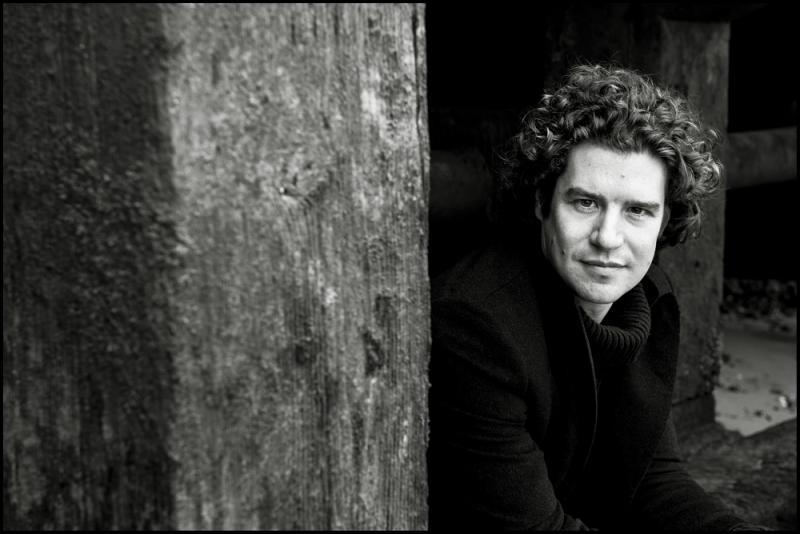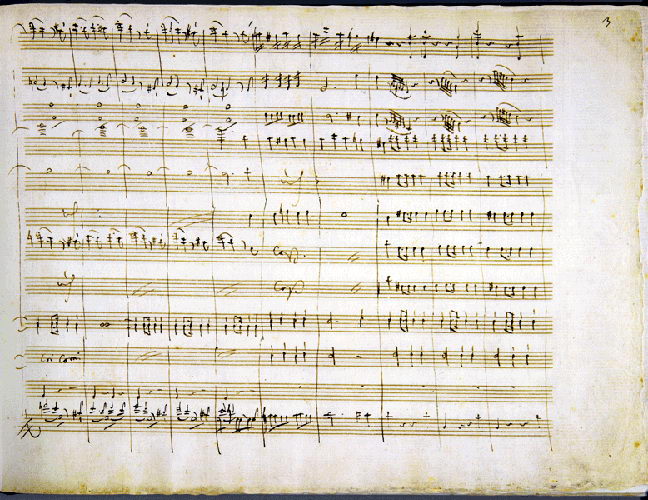Mozart's Last Symphonies, SCO, Ticciati, Usher Hall, Edinburgh | reviews, news & interviews
Mozart's Last Symphonies, SCO, Ticciati, Usher Hall, Edinburgh
Mozart's Last Symphonies, SCO, Ticciati, Usher Hall, Edinburgh
A mighty trilogy transfigured

His transformational Brahms series with the Scottish Chamber Orchestra may have been truncated by slipped disc troubles - he was much missed at Glyndebourne too - but Robin Ticciati is back with renewed energy and purpose. To judge from the brilliant but focused party they seemed to be having with Mozart's "Jupiter" Symphony last night, the players are as overjoyed as he is.
There was much to celebrate just in the evening alone: the last symphony came as the cathartic third act of an opera for orchestra which had led us from the majestic 39th into the woods of the radical 40th and out into the light again. Without that startling central departure from the major-key norm, I doubt if the odyssey would have worked as well as it did, though the fresh approach to articulation and style would have left us happy even with three mostly bright symphonies, too.
 Mackerras, Mozart's greatest champion and one-time tutor to Ticciati towards the end of his life, bequeathed an SCO in fine shape as an ensemble giving us the best of both worlds, the attack and the mostly brisk tempi of the authentic-movement approach alongside the sheen of modern instruments (whiplash timpani apart). Ticciati has gone one stage further with gut strings - all the more amazingly transformed when they put the mutes on in the 41st's slow movement (page from the original manuscript of the first movement pictured above) - and natural horns, wielded with revelatory clarity by the amazing Alec Frank-Gemmill and Patrick Broderick.
Mackerras, Mozart's greatest champion and one-time tutor to Ticciati towards the end of his life, bequeathed an SCO in fine shape as an ensemble giving us the best of both worlds, the attack and the mostly brisk tempi of the authentic-movement approach alongside the sheen of modern instruments (whiplash timpani apart). Ticciati has gone one stage further with gut strings - all the more amazingly transformed when they put the mutes on in the 41st's slow movement (page from the original manuscript of the first movement pictured above) - and natural horns, wielded with revelatory clarity by the amazing Alec Frank-Gemmill and Patrick Broderick.
Worth their weight in gold, they scythed home the shock of sudden pain in the E flat major 39th's Andante con moto - premonition, in this context, of anguish to come in the next masterpiece - and foregrounded in finale fireworks. The SCO wind, too, even with some new faces this time, are among the world's most characterful. Ticciati always gave them space even at generally fast but never over-pressed speeds, and creatively so in exposition repeats, which always managed to sound different; Ticciati makes much of the drama in a pause for silence, and accentuated that speciality last night. The three minuets' trios all came at a slightly slower speed for expressive space, both clarinets outstanding in No. 39's; when the minuet proper returned, in all three cases, it seemed cause for extra joy, all departments bristling with extra energy held in perfect balance.
Ticcati drives home that Andante is never Largo
The glow, if never the lingering, of a more romantic approach to Mozart than was ever known in the authentic movement's books came in the subtlest of rubato, and lovely violin portamenti to gild phrases in first movements. It struck me for the first time how the G minor work is a proto-Tristan revolution before the great C major's Meistersingerish reassertion of a tradition (Wagner no doubt got the idea of superimposing three themes in that opera's prelude from the astonishing coda of the "Jupiter" finale). Chromatics were effortlessly but still startlingly embraced within the flow of the whole, and when the finale's second theme comes back in the minor, the smoky colours of violas duly amazed.
You wanted to hear that a second time, and with all repeats intact, we got it. Even without them, there are some big-band performances where the conductor takes the lovely slow-movement ideas so lingeringly that you tire of hearing them a second, a third time. Never so with Ticciati, who unlike Bychkov in the disastrously-paced Royal Opera Così fan tutte, drives home that Andante is never Largo.
Always bright-eyed, the playing made us hear the final symphony afresh: not just looking back to Mozart's beloved Bach and his counterpoint, transfigured through the later composer's dazzling individuality, but also forward to the primal energy of Beethoven's Seventh, which Ticciati will be conducting next May. More Mozart's to come, too, in the shape of four masterly piano concertos; but already Ticciati and the SCO have done enough at the start of this season to show that they remain one of the best musical partnerships in the world.
rating
Explore topics
Share this article
Add comment
The future of Arts Journalism
You can stop theartsdesk.com closing!
We urgently need financing to survive. Our fundraising drive has thus far raised £49,000 but we need to reach £100,000 or we will be forced to close. Please contribute here: https://gofund.me/c3f6033d
And if you can forward this information to anyone who might assist, we’d be grateful.

Subscribe to theartsdesk.com
Thank you for continuing to read our work on theartsdesk.com. For unlimited access to every article in its entirety, including our archive of more than 15,000 pieces, we're asking for £5 per month or £40 per year. We feel it's a very good deal, and hope you do too.
To take a subscription now simply click here.
And if you're looking for that extra gift for a friend or family member, why not treat them to a theartsdesk.com gift subscription?
more Classical music
 From Historical to Hip-Hop, Classically Black Music Festival, Kings Place review - a cluster of impressive stars for the future
From quasi-Mozartian elegance to the gritty humour of a kitchen inspection
From Historical to Hip-Hop, Classically Black Music Festival, Kings Place review - a cluster of impressive stars for the future
From quasi-Mozartian elegance to the gritty humour of a kitchen inspection
 Shibe, LSO, Adès, Barbican review - gaudy and glorious new music alongside serene Sibelius
Adès’s passion makes persuasive case for the music he loves, both new and old
Shibe, LSO, Adès, Barbican review - gaudy and glorious new music alongside serene Sibelius
Adès’s passion makes persuasive case for the music he loves, both new and old
 Anja Mittermüller, Richard Fu, Wigmore Hall review - a glorious hall debut
The Austrian mezzo shines - at the age of 22
Anja Mittermüller, Richard Fu, Wigmore Hall review - a glorious hall debut
The Austrian mezzo shines - at the age of 22
 First Person: clarinettist Oliver Pashley on the new horizons of The Hermes Experiment's latest album
Compositions by members of this unusual quartet feature for the first time
First Person: clarinettist Oliver Pashley on the new horizons of The Hermes Experiment's latest album
Compositions by members of this unusual quartet feature for the first time
 Gesualdo Passione, Les Arts Florissants, Amala Dior Company, Barbican review - inspired collaboration excavates the music's humanity
At times it was like watching an anarchic religious procession
Gesualdo Passione, Les Arts Florissants, Amala Dior Company, Barbican review - inspired collaboration excavates the music's humanity
At times it was like watching an anarchic religious procession
 Classical CDs: Camels, concrete and cabaret
An influential American composer's 90th birthday box, plus British piano concertos and a father-and-son duo
Classical CDs: Camels, concrete and cabaret
An influential American composer's 90th birthday box, plus British piano concertos and a father-and-son duo
 Cockerham, Manchester Camerata, Sheen, Martin Harris Centre, Manchester review - re-enacting the dawn of modernism
Two UK premieres added to three miniatures from a seminal event of January 1914
Cockerham, Manchester Camerata, Sheen, Martin Harris Centre, Manchester review - re-enacting the dawn of modernism
Two UK premieres added to three miniatures from a seminal event of January 1914
 Kempf, Brno Philharmonic, Davies, Bridgewater Hall, Manchester review - European tradition meets American jazz
Bouncing Czechs enjoy their Gershwin and Brubeck alongside Janáček and Dvořák
Kempf, Brno Philharmonic, Davies, Bridgewater Hall, Manchester review - European tradition meets American jazz
Bouncing Czechs enjoy their Gershwin and Brubeck alongside Janáček and Dvořák
 Solomon, OAE, Butt, QEH review - daft Biblical whitewashing with great choruses
Even a top soprano and mezzo can’t make this Handel paean wholly convincing
Solomon, OAE, Butt, QEH review - daft Biblical whitewashing with great choruses
Even a top soprano and mezzo can’t make this Handel paean wholly convincing
 Two-Piano Gala, Kings Place review - shining constellations
London Piano Festival curators and illustrious friends entertain and enlighten
Two-Piano Gala, Kings Place review - shining constellations
London Piano Festival curators and illustrious friends entertain and enlighten
 Echo Vocal Ensemble, Latto, Union Chapel review - eclectic choral programme garlanded with dance
Beautiful singing at the heart of an imaginative and stylistically varied concert
Echo Vocal Ensemble, Latto, Union Chapel review - eclectic choral programme garlanded with dance
Beautiful singing at the heart of an imaginative and stylistically varied concert
 Scott, Irish Baroque Orchestra, Whelan, RIAM, Dublin review - towards a Mozart masterpiece
Characteristic joy and enlightenment from this team, but a valveless horn brings problems
Scott, Irish Baroque Orchestra, Whelan, RIAM, Dublin review - towards a Mozart masterpiece
Characteristic joy and enlightenment from this team, but a valveless horn brings problems

Comments
wot a Bravura review...mille
wot a Bravura review...mille grazie !